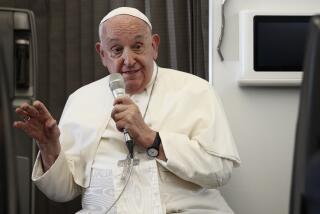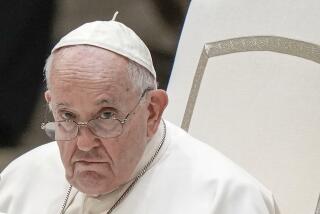Pope Offers Encyclical on Issues Involving Life : Religion: John Paul II gives overarching rationale for church opposition to contraception, abortion, euthanasia.
- Share via
In his most sweeping defense yet of life, Pope John Paul II today will issue a major encyclical strongly reaffirming the church’s opposition to contraception, abortion and euthanasia and for the first time all but declaring capital punishment to be morally unacceptable.
Although the Roman Catholic Church has spoken out repeatedly against abortion, euthanasia and what John Paul often has called “the culture of death,” the new encyclical, entitled Evangelium Vitae (the Gospel of Life), for the first time sets out an overarching moral rationale by which Catholics and “all people of goodwill” should judge a wide range of decisions involving human life.
Many of those decisions involve unprecedented scientific and medical developments such as experiments with human embryos, prenatal diagnostic techniques and in vitro fertilization that have put traditional moral doctrines to the test.
“It is this century’s Magna Carta proclaiming and defending human life,” said Cardinal Roger M. Mahony of Los Angeles, who speaks for U.S. Catholic bishops on life issues. Mahony is chairman of the Pro-Life Activities Committee of the National Conference of Catholic Bishops.
Carl A. Anderson, dean of the John Paul II Institute for Studies on Marriage and Family in Washington, said: “The Pope is setting the strategy for what I consider to be a dramatic new encounter by the church of the world in the next millennium.” He added that while the church’s teachings have always been clear, the underlying rationale has not.
In the works since the world’s Roman Catholic cardinals urged the Pope in 1991 to address troubling moral issues involving human life, the encyclical puts the full force of the church behind its previous pronouncements, including those on human genetics. Encyclicals are reserved for the most important teachings of the pontiff and are expected to be faithfully followed by the world’s 960 million Roman Catholics.
Originally scheduled to be released last year but put off because of delays in translation into various languages from the original Latin, the encyclical was hailed Wednesday by Mahony as “timeless” in its moral relevance, even in the face of unforeseen scientific and medical developments.
The encyclical was to be officially released today in Rome at noon.(3 a.m. Pacific Standard Time). Mahony held a news conference in Los Angeles on Wednesday on the condition that the encyclical and his remarks not be broadcast or published until after the 3 a.m. release.
At the heart of the encyclical is the biblical injunction found in both Hebrew and Christian Scriptures to “choose life.”
*
The 194-page document, signed by the Pope on Saturday after four years of consultation with the world’s Roman Catholic bishops, speaks out against the use of human embryos or fetuses for scientific experiments, and declares that when there is a conflict between civil and moral law--as in the case of abortions--Catholics “and all people of goodwill” have no obligation to obey civil law. It again restates the church’s opposition to suicide.
At the same time, John Paul acknowledged the good that can come from prenatal diagnostic techniques, provided they are used to make early therapy possible “or even to favor a serene and informed acceptance of the child not yet born.”
But the Pope declared that selective abortion to prevent the birth of children with genetic defects “is shameful and utterly reprehensible.” He said experimenting with human embryos “constitutes a crime against their dignity as human beings who have a right to the same respect owed to a child once born, just as to every person.”
In the United States, the federal government has refused to fund human embryo research, but it routinely takes place in private laboratories under self-imposed guidelines.
For the first time in an encyclical, the Pope also declared the church’s near total opposition to the death penalty. The only time capital punishment could possibly be justified, the Pope said, was when society could not otherwise defend itself. But, the Pope stressed, “such cases are very rare, if not practically nonexistent.”
Even as the encyclical spells out what is unacceptable, the Pope proposed no sanctions against those who act differently. Instead, the Pope at times sounded like a patient parish priest urging parishioners to consider the consequences of their choices.
“The Holy Father is urging and encouraging and calling and motivating,” Mahony said. “That’s the tone of this letter. No place in here does he say you shall do this or else.”
To women who have had an abortion, John Paul said the church was aware that many factors may have influenced their decision.
“Certainly what happened was and remains terribly wrong,” the Pope wrote. “But do not give in to discouragement and do not lose hope. Try rather to understand what happened and face it honestly. If you have not already done so, give yourselves over with humility and trust to repentance. The father of mercies is ready to give you his forgiveness and his peace in the Sacrament of Reconciliation (Confession).”
But the Pope also reaffirmed the church’s teaching that abortion is always a grave moral disorder.
As for world population growth, John Paul said artificial contraception is not the answer. Repeating arguments his envoys advanced last year at a United Nations Conference on Population and Development in Cairo, the pontiff called on governments to create economic, social, public health and cultural conditions that enable “married couples to make their choices about procreation in full freedom and with genuine responsibility.
For the first time, the Pope also mentions AIDS in an encyclical and declares that those with AIDS--just as those who suffer other problems--should be as much the recipients of the church’s charity and love as others.
Two Catholic authorities, Anderson and Father Thomas J. Reese, a senior fellow at Woodstock Theological Center at Georgetown University in Washington, said the encyclical will appeal as much to Protestants as to Catholics because of the Pope’s frequent citation of Scripture.
“He’s not simply relying on Catholic church teaching, doctrine and traditions. He’s going back to the Scriptures--and that’s very important ecumenically with other churches,” Reese said. They noted that the encyclical is addressed not only to Catholics but to “all people of goodwill.”
Despite the favorable reaction from Mahony, Anderson and Reese, one leading Catholic dissident took issue with the tone of the encyclical.
“It’s an encyclical called the Gospel of Life and yet it deals with the issues that the Vatican has talked about time and time again: abortion, euthanasia--and contraception, which isn’t even an issue of the taking of life,” said Sister Maureen Fiedler of Catholics Speak Out, based in Hyattsville, Md. “When are we going to hear something about racism and ethnic violence in the world?”
The Pope and bishops have spoken out before on such issues.
Fiedler also complained about the encyclical’s “sexist” language and added that the Pope was not as unequivocal in opposing capital punishment as he was on abortion and contraception.
Pope John II has issued 10 previous encyclicals, including one on redemption and dignity of the human race and one on the Holy Spirit’s role in the Church. One of the best known modern encyclicals was Pope John XXIII’s 1963 Pacem in Terris, on the importance of establishing universal peace.
(BEGIN TEXT OF INFOBOX / INFOGRAPHIC)
In the Pope’s Words
Following are excerpts from Pope John Paul II’s encyclical.
ON POPULATION GROWTH
“It is . . . morally unacceptable (for authorities) to encourage, let alone impose, the use of methods such as contraception, sterilization and abortion in order to regulate births.”
CIVIL VS. MORAL LAW
“Abortion and euthanasia are . . . crimes which no human law can claim to legitimize. There is no obligation in conscience to obey such laws; instead there is a grave and clear obligation to oppose them by conscientious objection.”
DEATH PENALTY
“The nature and extent of the punishment must be carefully evaluated and decided upon and ought not to go to the extreme. . . . Such cases are very rare, if not practically nonexistent.”
More to Read
Sign up for Essential California
The most important California stories and recommendations in your inbox every morning.
You may occasionally receive promotional content from the Los Angeles Times.









